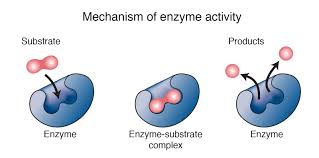WHAT IS ENZYME- NATURE AND PROPERTIES
DEFINITION
Enzymes are proteinaceous substance that acts as biological and organic catalysts which alter the rate of chemical reactions that takes place in the living systems.
Enzyme catalysis is essential for almost all metabolic processes in the cell, in order to speed up the rate of reaction to sustain the life. Therefore, enzymes are vital for life and serve a wide range of important functions in the body.
- Catalyst– Catalysts are such substances which increase the rate of chemical reaction and this process is called catalysis.
- Substrates– The molecules upon which enzymes act are called substrates. The substrate bind to a region on the enzyme called the active site.
- Products– Enzymes converts the substrates into different molecules known as products.

NATURE AND PROPERTIES OF ENZYMES
- Enzymes are specific in reaction with substrate.
- They are colloidal in nature and thus provide large surface area for reaction.
- Enzymes accelerate the reaction in several ways, all of which lower the activation energy.
- They are required in small amounts and remain unaffected in the reaction. It means enzymes don’t affect the equilibrium.
- They are organic catalysts and are pH regulated.
- Enzymes are heat sensitive and enzymic activity can be inhibited too.
- Enzymes are made up of only Apoenzyme (protein part) or Apoenzyme + cofactor (non-protein part).
Read also… CLASSIFICATION OF ENZYMES

MODE OF ACTION
An enzyme attract substrate molecule on its active site, catalyze the chemical reaction and form the combination of an enzyme-substrate complex. The enzyme substrate relationship is often compared to as Lock and Key Theory proposed by Fischer (1894).
Read more..
CLASSIFICATION OF ENZYMES
DIFFERENCE BETWEEN DIFFUSION AND OSMOSIS
PLANT HORMONES- FACTS, TYPES & EFFECTS
PLANT HORMONES- FACTS, TYPES & EFFECTS
WHAT IS POLLINATION- PROCESS & MECHANISM
WHAT IS HYBRIDIZATION-FACTS, AIM & TYPES
EMASCULATION MEANING- PURPOSE & METHODS